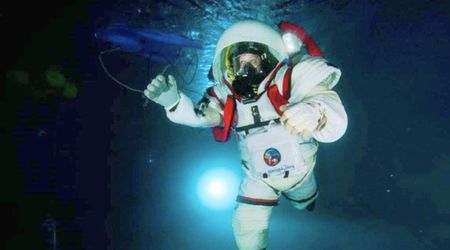NASA astronaut watched Earth from space for the first time and realized humanity is 'living a lie'

The effect that space has on an astronaut is a personal experience, and the profoundness of it can never be measured. There is an effect in place for the realization of astronauts about the detached life on land when Earth is seen from space. This is the “overview effect” that instills a sudden responsibility to protect this fragile ‘whole’ that has no borders or divisions, according to Big Think. Astronaut Ron Garan explained in an interview how humans were “living a lie” as he confronted the reality of the vast and undivided planet protected by a thin paper-like atmosphere.

Garan spent 178 days in space and completed more than 71 million miles in 2,842 orbits. As he looked out at the planet, he realized how fragile the planet was. This made him compare the life he saw in space to the human-made entities that functioned on land. The “paparazzi-like flashes of lightning storms” and the “dancing curtains of auroras” were reduced to a commodity that demanded monetization. Garan explained how he could not see the economy, which treated our basic life systems as a “subsidiary” to it. The vantage point in space nullified this perspective.

Garan noted how the world was so busy dealing with global warming, deforestation, and loss of biodiversity as individual issues. He believed that they all had the same cause - “we don’t see ourselves as planetary.” “We need to move from thinking economy, society, planet to planet, society, economy. That's when we're going to continue our evolutionary process,” he explained. The former astronaut and combat fighter pilot authored the book Floating in Darkness: A Journey of Evolution. His purpose was to spread this, and this was his life message.

The astronaut utilized Plato’s ‘allegory of the cave’ to ideate how we as a population thought we saw the whole picture, when in reality it was rather narrow. He highlighted how we were paying a “high price” as a civilization due to our lapse in having a more planetary outlook on things. Though the economy could solve various problems and improve the quality of life, it was also immensely disastrous. It had destructive effects on the planet, which we failed to see, and that was a huge part of why the solution to tackle our global crisis seemed unattainable.

Garan insisted on how various space missions elicited a similar effect in astronauts, such as the first image of Earth from the far side of the moon. This distance from the land made him see the interconnectedness of nature and reality. He preached on this being the cause that would lead humanity to peace on Earth. “If the overview effect is the lightbulb that pops,” about the interconnected and interdependent we are, “ then the Orbital perspective is the call to action.” This is the sense of justice from witnessing the contradictory beauty of the planet and reality.
Garan also employed the use of film and cinematography to capture the idea he insisted on, emphasizing the effects of ‘dolly zoom.’ He talked about how it was not necessary to be in orbit or in space to realize this reality. The people on Earth have a “powerful position” to incite a movement for change. If the awareness reached the ‘Critical Mass’, it would pave the way to solve our planetary issues. Once we escape the “two-dimensional us versus them mentality and embrace the true multidimensional reality,” we shall witness the rise of a new dawn.









